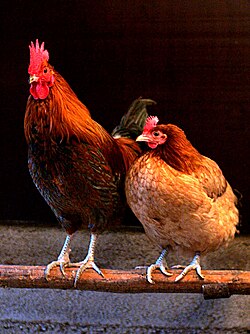gà
Hello, you have come here looking for the meaning of the word gà. In DICTIOUS you will not only get to know all the dictionary meanings for the word gà, but we will also tell you about its etymology, its characteristics and you will know how to say gà in singular and plural. Everything you need to know about the word gà you have here. The definition of the word gà will help you to be more precise and correct when speaking or writing your texts. Knowing the definition ofgà, as well as those of other words, enriches your vocabulary and provides you with more and better linguistic resources.

Gà
See also: Appendix:Variations of "ga"
Cornish
Pronunciation
Determiner
gà
- (Standard Cornish) short for aga
Mandarin
Alternative forms
Romanization
- Hanyu Pinyin reading of 尬
- Hanyu Pinyin reading of 骱
Vietnamese

Alternative forms
Etymology
From Proto-Vietic *r-kaː. Cognate with Muong Bi ca, Thavung กา. Compare Khmer រកា (rɔkaa, “Year of the Rooster”).
The sense of "inexperienced" comes from a ranking in the video game Gunbound.
Pronunciation
Noun
(classifier con) gà • (鷄, 雞, 猗, 鵸, 𤠄, 𪂮, 𪃴, 𪃿)
- chicken (bird)
- gà chọi ― gamecock
- Khôn ngoan đối đáp người ngoài.
Gà cùng một mẹ chớ hoài đá nhau.- If you think you're so smart, engage outsiders.
We're chicks who share a mother, so don't fight each other.
- If you think you're so smart, engage outsiders.
Derived terms
Adjective
gà
- (slang) inexperienced or unskilled; newbie
- Thằng này gà quá! Coi anh mày làm này!
- You're so weak! Watch me, the expert, in action!
Verb
gà
- (card games) to up the ante
- Gà lần nào cũng thua thì đánh làm gì.
- Every time you/they up the ante, you/they lose, so why bother?
- to give away an answer (e.g., to a math exercise)
- Để em nó tự làm toán, anh đừng gà cho nó.
- Let him/her solve the math problem on his/her own; don't give the answer away.
- (board games) to give a hint or tip; to forgo a turn
- Cờ đương bí, ông ấy chỉ gà cho một nước mà thành thắng.
- In a stalemate, he gave up a single turn which meant giving up a victory.
Usage notes
The sense of "upping the ante" is primarily used in traditional Vietnamese card games such as tổ tôm, tài bàn, and chắn.
References
- ^ 2021 June 14, Mặt Trứng, “Phá đảo, gà, ra chợ và nguồn gốc của những thuật ngữ mà chỉ các game thủ thế hệ 8-9x mới hiểu được”, in GameK.vn:
- Thế nên, ở thời điểm bấy giờ, nếu như gặp phải một đối thủ có hình "gà con" trong game, đa số người chơi đều mặc định luôn đó là những gã có kỹ năng tệ hại, và từ đó, thuật ngữ gà ra đời.
- (please add an English translation of this quotation)